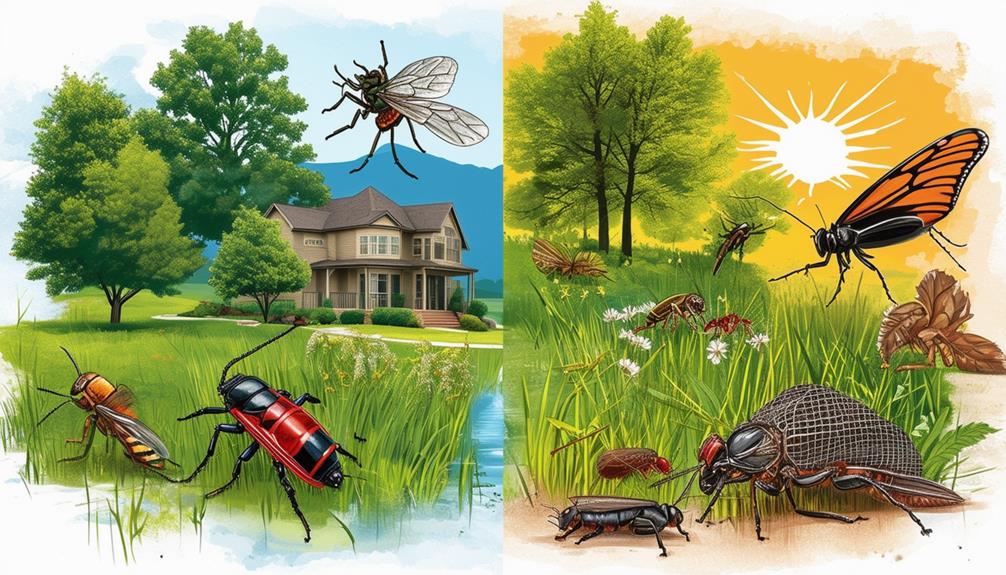To keep mosquitoes away, start by removing standing water sources. Change pet water regularly, use BTI bacteria in water, and plan proper drainage. Plant citronella, lavender, marigolds, and basil as natural repellents. Trim landscapes, mow lawns, and avoid overwatering. Use essential oils like citronella and basil. Try bug-repelling lights like sodium lamps strategically. Consider larvicides, mosquito traps, and repellents. Educate your community about prevention. Implement these steps for a mosquito-free yard.
Key Takeaways
- Remove standing water sources like old tires and change pet water regularly.
- Plant mosquito-repellent plants such as citronella and lavender.
- Maintain yard by mowing, trimming, and reducing shade to deter mosquitoes.
- Use natural repellents like essential oils and plant-based solutions.
- Install insect-repelling lights and consider mosquito control products for added protection.
Eliminate Standing Water Sources
To effectively reduce mosquito populations in your yard, the first step is to eliminate all sources of standing water where mosquitoes can breed. Mosquitoes are attracted to stagnant water sources like bird baths and clogged gutters, making them prime breeding grounds. Female mosquitoes can lay over 700 eggs in their lifetime, perpetuating the cycle.
Removing items that hold water, such as old tires and containers, is vital in eliminating mosquito breeding sites. Additionally, regularly changing the water in pet dishes and bird baths can prevent mosquito larvae from developing into adults. Utilizing an all-natural BTI bacteria formula in standing water helps inhibit the growth of mosquito larvae, further decreasing their numbers.
Choose Mosquito-Repellent Plants Wisely
When selecting mosquito-repellent plants for your yard, consider the effectiveness of citronella, lavender, marigolds, basil, and chrysanthemums due to their natural repellent properties.
Citronella plants are renowned for their mosquito-repelling capabilities attributed to the citronellal compound they contain.
Lavender plants, emitting a fragrance disliked by mosquitoes, serve as an effective natural repellent.
Marigolds, containing pyrethrum, a natural insect repellent, can help deter mosquitoes from your yard.
Basil plants release essential oils with mosquito-repelling properties, making them a valuable addition to your garden.
Chrysanthemums produce pyrethrin, a natural insecticide that effectively repels mosquitoes.
By strategically incorporating these mosquito-repellent plants into your yard, you can create a more pleasant outdoor environment while naturally deterring these pesky insects.
Experiment with these plant varieties to find the ones that work best for your yard and enjoy a mosquito-free outdoor space.
Maintain Your Yard Regularly
Maintain your yard regularly by implementing practices such as mowing the lawn, trimming hedges, tilling weedy areas, strategically planting shrubs and tall grass, and reducing shade to minimize mosquito habitats.
Important lawn maintenance is essential as tall grass provides hiding spots for mosquitoes. By trimming hedges and bushes, you eliminate resting areas for these pests.
Tilling or mowing weedy areas helps remove breeding grounds where mosquitoes lay their eggs in standing water. Strategic placement of shrubs and tall grass can disrupt the environment mosquitoes prefer for breeding.
Additionally, reducing shade in your yard discourages mosquitoes from resting and breeding, as they prefer cool and dark areas. By following these steps, you can control mosquito populations in your yard effectively, creating a more mosquito-free environment for you and your family to enjoy.
Utilize Natural Repellents and Oils
Using natural repellents and oils is a proven method to deter mosquitoes from invading your yard and bothering you and your family. Essential oils such as citronella, eucalyptus, and lavender are known for their effectiveness as natural mosquito repellents. Among these, citronella oil stands out for its ability to repel mosquitoes and other insects successfully. These essential oils can be diluted and applied to the skin or used in diffusers to keep mosquitoes at bay.
Additionally, planting mosquito-repelling plants like basil and mint in your yard can help create a barrier that deters mosquitoes from entering the area. Embracing natural repellents like essential oils not only assists in repelling mosquitoes but also contributes to an eco-friendly approach to mosquito control. By incorporating these methods and creating a mosquito-free yard, you can enjoy your outdoor spaces without the nuisance of these unwanted pests.
Install Insect-Repelling Lights
To effectively ward off mosquitoes in your yard, consider installing insect-repelling lights such as sodium lamps, yellow bug lights, or LED lights. These specialized lights emit wavelengths that are less attractive to mosquitoes, helping to keep them at bay during outdoor gatherings. You can find these insect-repelling lights at home goods stores, specifically designed to deter mosquitoes and create a bug-free outdoor environment.
LED lights, yellow bug lights, and sodium lamps offer different options for mosquito control, allowing you to choose the type that best suits your preferences and needs. By strategically placing these lights around your yard, you can effectively combine lighting with mosquito control to keep your outdoor space bug-free.
Incorporating insect-repelling lights into your mosquito-proofing strategy is a proactive step towards enjoying a comfortable outdoor environment. Make sure to follow the instructions for installation and maintenance to maximize the effectiveness of these lights in deterring mosquitoes and creating a pleasant outdoor atmosphere.
Clear Debris and Weedy Areas
Clearing debris and weedy areas in your yard not only enhances its appearance but also greatly reduces potential hiding spots for mosquitoes. Mosquitoes are attracted to unkempt areas where they can breed and hide, so by removing debris and weedy areas, you can help minimize the mosquito population in your yard. Overgrown vegetation provides ideal breeding grounds for mosquitoes, making it essential to maintain a well-manicured yard to deter these pests from settling in your outdoor space.
| Importance of Clearing Debris and Weedy Areas | |
|---|---|
| Reduces Mosquito Population | Clearing debris and weedy areas minimizes hiding spots, discouraging mosquitoes from breeding. |
| Enhances Aesthetic Appeal | Maintaining a well-manicured yard improves the overall look of your outdoor space. |
| Promotes Healthier Environment | Removing overgrown vegetation reduces potential mosquito breeding grounds, creating a healthier outdoor environment. |
Create Proper Drainage Systems
By implementing effective drainage systems such as French drains and catch basins, you can successfully prevent standing water accumulation in your yard, ultimately deterring mosquito breeding grounds. French drains function by utilizing a sloped trench filled with gravel and a perforated pipe to redirect surface and ground water away from your yard, eliminating areas where mosquitoes thrive.
Similarly, catch basins connected to drainage pipes can be strategically placed in planter boxes to prevent water pooling, ensuring proper water drainage and eliminating potential mosquito breeding sites. These essential drainage systems are vital in maintaining a mosquito-free environment as they help eliminate standing water, a key breeding ground for mosquitoes.
Utilizing solutions like French drains and catch basins not only enhances the aesthetics of your outdoor spaces but also plays a significant role in preventing mosquito infestations by keeping water from stagnating. Implementing these measures from home improvement stores can greatly contribute to creating a pleasant and mosquito-free yard.
Incorporate Pest Control Measures
Incorporate pest control measures like planting mosquito-repellent herbs and flowers to effectively deter mosquitoes in your yard. These natural solutions can help keep these pests at bay without the use of harmful chemicals.
Essential oils, candles, or natural sprays are also great options to contemplate. For a more tailored approach, professional pest control services can provide effective solutions for eliminating mosquitoes from your outdoor space.
Additionally, installing insect-repelling lights around your yard can create a barrier against mosquitoes, especially during outdoor gatherings. To address potential mosquito breeding sites, contemplate incorporating drain systems in planter boxes and French drains to prevent water pooling.
Frequently Asked Questions
How Do I Mosquito Proof My Backyard?
To mosquito-proof your backyard, incorporate natural solutions like plant repellents, water management, essential oils, and citronella candles. Utilize bug zappers, landscaping tricks, and DIY traps. Implement these strategies to create a more mosquito-resistant environment.
How Do I Get Rid of Mosquitoes in My Yard Permanently?
To get rid of mosquitoes in your yard permanently, consider natural remedies like essential oils, citronella candles, and bug zappers. Eliminate standing water, use outdoor fans, plant repellent plants, and seek professional services for long-lasting mosquito control.
What Do Mosquitoes Hate the Most?
Mosquitoes hate the scent of citronella, lemongrass, chrysanthemums, eucalyptus, lavender, peppermint oil, lemon eucalyptus, marigolds, garlic spray, tea tree, and rosemary bushes. Utilize these natural repellents strategically to create a mosquito-free environment in your yard.
What Is the Best Homemade Mosquito Repellent for the Yard?
To create the best homemade mosquito repellent for your yard, mix essential oils like citronella, lemon eucalyptus, and lavender with carrier oils. Plant marigold flowers and rosemary bushes. Incorporate garlic spray and peppermint oil.





